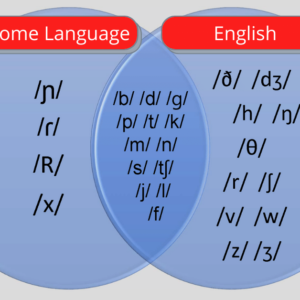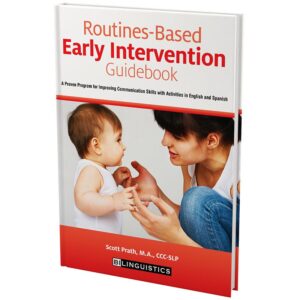Early intervention professional development has never been more needed, more impactful and easier to complete!
Half of the children enrolled in early intervention have communication difficulties. We need ways to improve their speech and language skills while working with other professionals and getting parents and teachers on board.
JOIN the growing numbers of early intervention specialists who are increasing their confidence when working with children with communication delays and with children who speak a second language!
EARN early intervention professional development units while learning about the speech and language development of the children you serve. These courses do not award credit from the American Speech-Language Hearing Association (ASHA). Click here to see related speech therapy courses.
IMPROVE your interactions with families by learning about the social influences that affect their follow-through and attendance rate.
Bilinguistics has been researching, publishing, presenting on, and most importantly working in early intervention since 2002. Use our courses to make your life easier and your work more impactful.
Early Intervention Professional Development
-

Difference or Disorder? Speech Development in English Language Learners
$22.00 Add to cart -

Difference or Disorder?: Language Development in English Language Learners
$30.00 Add to cart -

Effective Educational Strategies That Take Poverty into Consideration
$15.00 Add to cart -

Effectively Evaluate Young Children
$15.00 Add to cart -
Ethical Considerations with CLD Populations
$30.00 Add to cart -
Family Centered Practice for Speech-Language Pathology
$15.00 Add to cart -
Increasing Parent and Teacher Involvement
$15.00 Add to cart

Why Is Early Intervention Professional Development Important?
Understanding the unique needs of infants and young children
Infants and young children have unique needs that require specialized knowledge and skills to support their development. Early interventionists need to have a deep understanding of child development, including milestones and age-appropriate behaviors, to provide effective interventions. Professional development opportunities can provide early interventionists with the knowledge and skills necessary to effectively support young children and their families.
Staying up-to-date with research and evidence-based practices
Research in early childhood development is constantly evolving, and early interventionists need to stay current with new findings and evidence-based practices. Professional development opportunities can provide access to new research, best practices, and techniques to improve their work with young children and their families.
Improving communication and collaboration with families and other professionals
Effective communication and collaboration with families and other professionals are essential in early intervention. Professional development opportunities can provide early interventionists with strategies and skills to improve their communication and collaboration with families and other professionals.
Meeting state and federal requirements for certification and licensure
State and federal regulations require early interventionists to maintain certification and licensure. Professional development opportunities provide a way to fulfill these requirements and stay current with changes to regulations and policies.
Types of Professional Development for Early Interventionists
Conferences and workshops provide opportunities for early interventionists to learn from experts in the field, exchange ideas with colleagues, and gain new knowledge and skills. They can be held in person or online, and many organizations offer continuing education credits for attendance. We love getting to conferences and interacting with other interventionists. However, we don’t always have the time or we need to solve a specific problem with a family before the next conference.
Online courses and webinars provide a flexible way for early interventionists to learn at their own pace and on their own schedule. They can cover a range of topics, from child development to specific intervention techniques, and are often free or low-cost.
Besides, continuing education units (CEUs) are required for maintaining certification and licensure in many states. They can be earned through attending conferences and workshops, online courses, and other professional development opportunities.
Challenges Of Professional Development for Early Interventionists
Something that is unique to early intervention professionals compared to other interventionists and therapists is the amount of time that is spent with the whole family and the distance that we often have to travel between visits. This takes up a good portion of our schedule and our budget making, online early intervention professional development even more appealing.
Time constraints
Early interventionists often have busy schedules and travel between visits, which makes it difficult to find time for professional development. Between providing services to young children and their families, paperwork, and meetings, finding time for professional development can be a challenge.
Limited funding
Professional development opportunities can be costly, especially if they require travel or are not offered by the employer. Early interventionists may struggle to find funding for professional development, particularly if they work in underfunded programs.
Access to training
Professional development opportunities may not be readily available to all early interventionists, particularly those who work in rural areas or with underserved populations. This can limit access to important knowledge and skills.
Why Take the Early Intervention Professional Development Courses at Bilinguistics?
We know you have many options, some free, to fulfill your continuing education requirements. Our courses are unique because we gained our experience from being out there driving to visits with families from diverse backgrounds. We’ve built our reputation on the professional relationships we have developed and have baked the realities of our job into these courses. Then, we researched the most effective techniques, tried them out among our staff, presented them through live workshops with early interventionists to get feedback, and finally wrapped them up into the courses you find here today.
Professional development is essential for early childhood interventionists to stay up-to-date with the latest research and evidence-based practices. However, finding time and resources for professional development can be a challenge. Time management techniques, seeking out free or low-cost professional development opportunities, collaborating with colleagues, and advocating for increased funding and support are all strategies that can help overcome these challenges. By prioritizing professional development that covers the topics you need and the children you work with, you can continue to provide high-quality services to young children and their families.






